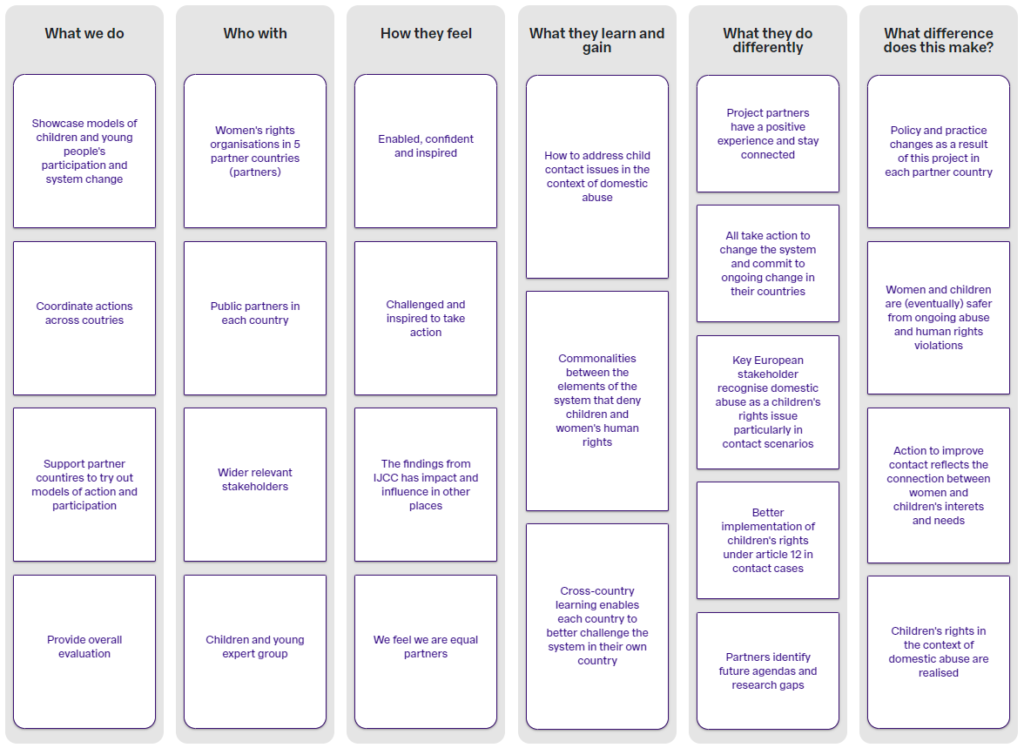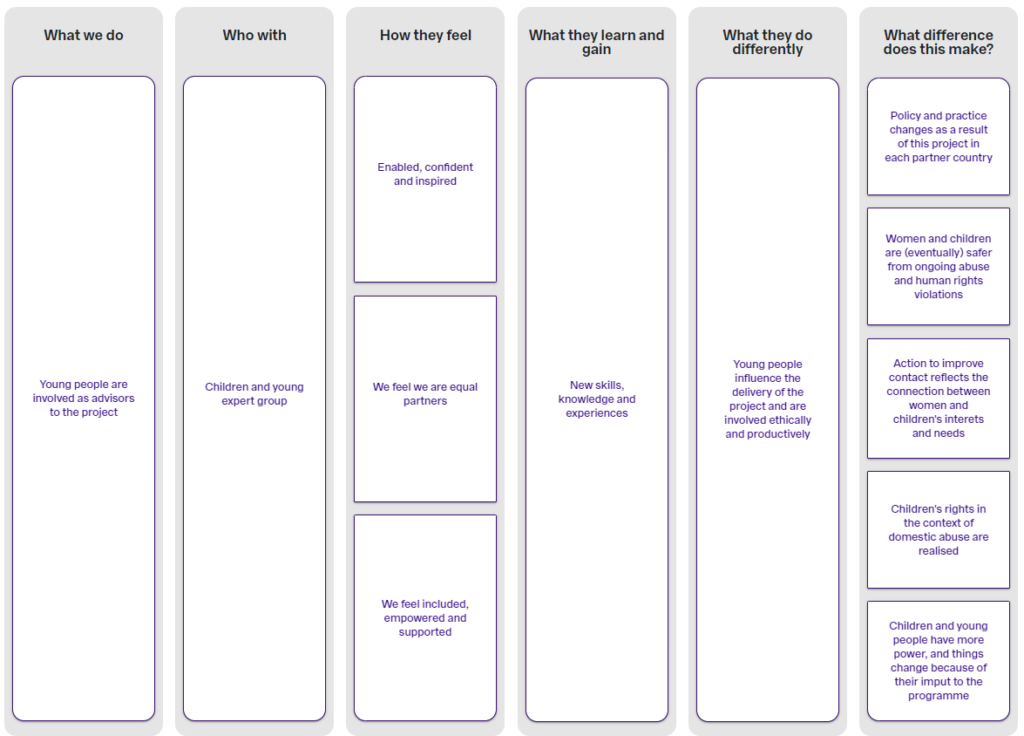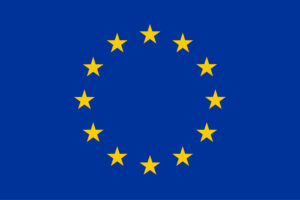Improving Justice in Child Contact Evaluation
Author: Sarah Morton, Matter of Focus
Children’s views about whether they feel safe or want to have to see parents who have been abusive, are often ignored by the courts. This puts them in dangerous and harmful situations (read more HERE)
Matter of Focus worked with women’s rights organisations from five countries across Europe as part of this project to improve women and children’s experiences of child contact following domestic abuse. The project was led by Scottish Women’s Aid and the University of Edinburgh and is funded by the European Union’s Rights, Equality and Citizenship Programme (2014-2020).
What we did
Achieving policy and practice change to better support women and children, and ensuring children’s rights are respected, are challenging outcomes.
Our work on this project helped ensure that the programme focussed on outcomes, and that data was collected in five different countries (Scotland, Bulgaria, Romania, Cyprus and Portugal) in similar enough ways to be able to make some comparisons and to be able to make claims about the contribution of the programme overall.
We worked closely with the core team to embed evaluation in the programme from the start, and mapped out the project’s outcomes. We supported the evaluation of young people’s involvement in the project coordination.
Everyone in this programme needed to be inspired to take action and have the support they need to make a difference in their country. We wanted them to feel that evaluation is practical and doable, and that the data and feedback collect can help them deliver a better programme.
A great fit
The programme took a systems approach to tackle the problems women and children experience when contact with an abusive partner is ordered by the courts. This is important because the problem is a systemic one – with the police, court systems, social workers, children’s organisations, policy makers and domestic abuse support organisations all having a part to play to if change is going to happen. Because the Matter of Focus approach takes account of this complexity, there was a great fit.
I have found the IJCC project quite complex to understand (as a new person coming into it when other people had been involved in its development for years). So I found the outcome mapping process helpful in terms of pinning down/simplifying what we’re trying to get to.
An evaluation framework
We mapped the programme activities to the outcomes that are important through a collaborative process with the core team.

Source: Sarah Morton/ IJCC programme overall evaluation pathway 1
We agreed a set of standard feedback questions for multi-stakeholder meetings that will took place in each country. These included the sectors that were engaged, and how different stakeholders think they can take action to ensure that women and children’s rights are realised in child contact following domestic abuse.
We worked with the young advisors group YELLO! to review the outcome map and make sure it reflected their perspectives.

Source: Sarah Morton/ IJCC programme overall evaluation pathway 2
I thought it was really good to breakdown the ‘who with’ and the outcomes for different people. We’re recognising and valuing in our outcome mapping the importance of enhanced relationships between the project partners – the solidarity and support which … is particularly important because that sort of emotional labour/relational approach outcome is often not identified and valued.
Both of these maps formed the basis for evaluation of the project. We collated the data from within countries and pulled this together across the whole project. We collected data from group reflection, stakeholder surveys at 2 points, as well as feedback from the stakeholder meetings. We pulled this together into interim and final evaluation reports.
What did we find out about this project’s contribution to outcomes?
- Over 180 stakeholder agencies were engaged with the project including the police, courts, social workers, local government and independent agencies with an interest in women and children’s rights in contact and domestic violence.
- Across the countries, stakeholders report better understanding of the needs of women and children in families where domestic violence is an issue, and changes in attitudes around the rights of parents with a history of violence to have contact with children.
- Many new connections were made within each country, resulting in better communication and coordination potential despite very different contexts.
- Children and young people were engaged and involved in each country, and their voices were elevated to help professionals and policy-makers understand how these issues affect them and sharpen their resolve and perception of solutions
- In each country the project partners designed and developed ways of engaging with the issues that were suitable for their contexts
- There have been many policy and practice impacts across the partner countries:
- In Bulgaria more specialist training has been developed and discussion is underway to improve children’s experience in the court system
- In Cyprus there will be a children’s rights officer in the Women’s House – a specialist service for domestic abuse.
- In Scotland there is more protection for children in contact orders through the Children Scotland Act
- In Portugal there have been widespread impacts building on the conducive environment created by the ratification of the Istanbul Convention, with several new laws that take children’s rights into account in the case of domestic abuse.
- In Romania, young people have engaged with key stakeholders with commitments for judicial and legislative change.
- Several countries report that they will continue their work on these issues and that further impacts are likely in the future.
You can read the full evaluation report HERE.




Comments are closed
Comments to this thread have been closed by the post author or by an administrator.